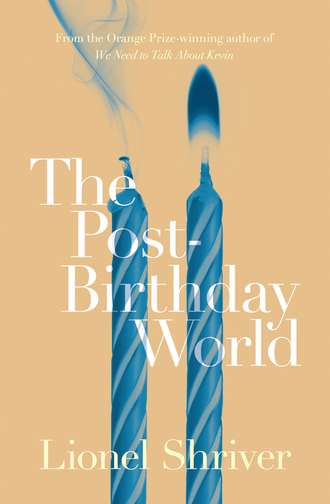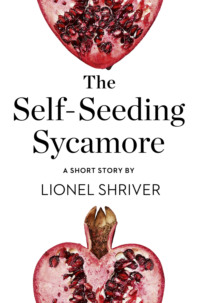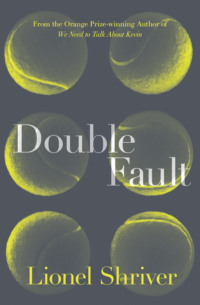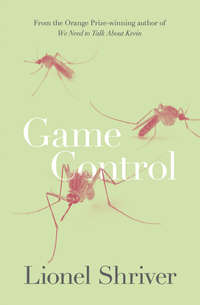
Полная версия
The Post-Birthday World
“We’ve got another twenty minutes,” he said, splaying on the couch opposite. “So how’s tricks? Anything new?”
“Oh,” she said, “nothing much since we last spoke.” Behold, her first lie. Irina had a queasy feeling that it wouldn’t be her last.
“Didn’t you have dinner with Ramsey? Don’t tell me you chickened out.”
“Oh, right,” she said thickly. She was no good at this. She was already botching it. Of course she’d have to give an accounting of last night. But the mere sounding of Ramsey’s name gave her palpitations. “Yes, we did that.”
“So how was it? You were worried that you’d have nothing to say to each other.”
“We managed,” she said. “I guess.”
Lawrence was beginning to look irked. “Well, what did you talk about?”
“Oh, you know—Jude. Snooker.”
“Is he entering the Grand Prix this year? Because I thought I might go.”
“I have no idea.”
“I wondered if his ranking’s slipped enough to have to play the qualifiers.”
“Beats me.”
“Well, you can’t have talked that much about snooker.”
“No,” she said. “Not so much.” It was as if she had to hoist every word from her mouth with a forklift.
“Did you at least get any good gossip?”
Irina tilted her head. “Since when did you care about ‘gossip’? That is, about what’s going on in someone’s heart, and not in their head?”
“I meant like, is it true that Ronnie O’Sullivan has checked himself into rehab. What’s your problem?”
“I’m sorry,” she said, and meant it. She had not, overnight, turned into an ogre, and she gazed at her partner mournfully. It was obscene, though, that he couldn’t tell the difference the moment he walked in the door, if a flicker of nervousness ran through her that maybe he had. Since Lawrence avoided the main thing like the plague, the fact that he hadn’t remarked on her lacklustre response to his home-coming was if anything a red flag. It was hardly subtle: so far this conversation was reminiscent of a prison visit. They seemed separated by a thick pane of glass, and spoke haltingly as if through receivers. After all, Irina had broken a law of a kind, and had just begun her first day of what could prove a very long sentence. She added pitifully, “I made you a pie.”
“I had a snack on the plane … Sure, why not. A small piece.”
“Would you like a beer with that?”
“I’ve already had a Heineken … What the hell, let’s celebrate.”
“Celebrate what?”
“The fact that I’m back.” He looked wounded. “Or didn’t you notice?”
“I’m sorry,” she said again. “Yes, of course. That’s what the pie is for. To welcome you home.”
In the kitchen, she leaned her palms against the counter, dropped her head, and breathed. It was a relief to escape Lawrence’s company, however briefly; yet from the fact of the relief itself there was no escape, and it cored her.
Leadenly, Irina removed the pie from the fridge. Chilling for under two hours, it wasn’t completely set. With any luck the egg in the filling had cooked thoroughly enough that the pie’s having been left out on the counter for a full day wasn’t deadly. Well, she herself wouldn’t manage more than a bite. (She’d not been able to eat a thing since that last spoonful of green-tea ice cream. Though there had been another cognac around noon …) The slice she cut for herself was so slight that it fell over. For Lawrence, she hacked off a far larger piece—Lawrence was always watching his weight—than she knew he wanted. The wedge sat fat and stupid on the plate; the filling drooled. Ramsey didn’t need admiration of his snooker game, and Lawrence didn’t need pie.
She pulled an ale from the fridge, and pondered the freezer. Normally, she’d join him with a glass of wine, but the frozen Stol-ichnaya beckoned. Since she’d brushed her teeth, Lawrence needn’t know that she’d already knocked back two hefty belts of neat vodka to gird herself for his return. Spirits on an empty stomach wasn’t like her, but apparently acting out of character could slide from temporary liberation to permanent estrangement from your former self in the wink of an eye. She withdrew the frosted bottle, took a furtive slug, and poured herself a better-than-genteel measure. After all. They were “celebrating.”
Lawrence was too polite to object that she’d served him a slice much bigger than he’d asked for, and exclaimed, “Krasny!”
“That’s ‘red,’ you doorak,” she said, in the best imitation of affectionate teasing she could muster. “‘Beautiful’ is krasivy. Red Square, krasnaya ploshchad, da?”
Ordinarily Lawrence’s tin ear for Russian made her laugh, but there was an edge on her voice that made Lawrence look over.
“Izvini, pozhaluysta,” he apologized correctly. “Konyeshno, krasivy. As in, krasivy pirog”—she was amazed that he knew the word for “pie”—“or, moya krasivaya zhena.”
For pity’s sake. Even in Russian, he called her his “wife.” The term had never before struck her as cheeky, but it did now.
And it was typical, wasn’t it, that he could only call her beautiful in Russian. In English, she was cute, a safe, minimizing adjective that could as easily apply to a hamster as to a “wife.” It wasn’t fair to be irritated by a perfectly lovely compliment, but the resort to speaking in tongues when coming anywhere near emotional subject matter was painfully reminiscent of her father. A dialogue coach for mostly B-movies, her father was a master of accents; his work ran along the lines of coaching the man who did the voice of Boris Badenov in Bullwinkle on how to thicken his consonants with Soviet wickedness. He could switch readily from Chinese “flied lice” to Irish brogue, and she supposed it was all very amusing. Except that he had never told her he loved her, or was proud of something she’d accomplished, unless rolling his Rs like Sean Connery or lapsing into a Swedish lilt—I lahf me leetle dahter, jaaaaaa! She’d adored all the voices he’d employed reading her stories when she was little, but as she grew older the charm wore off. Why, he was born in Ohio, but even his Midwestern delivery sounded like one more accent.
Besides, Lawrence may have used Russian as a device to arms-length sentiments that might sound embarrassing in English, but it was also their private argot, and right now it was too much. It was too intimate. It hurt. “Thank you,” she said firmly in English, and brought the Russki speak to a close.
Lawrence tried, with one more line, to keep it going. “Tih u-sta-la?” His minor-key delivery was wrenchingly tender, and Irina bowed her head. She hadn’t touched her pie.
“Yes, I’m a little tired. I didn’t sleep well.” She hoped this didn’t count as her second lie. Arguably “not sleeping at all” fell under the subhead of “not sleeping well.”
“Something on your mind?” He had noticed. He was fishing.
“Oh, maybe it was the sushi. Only takes one piece of dicey tuna. My appetite’s off. I’m not sure I can eat this.”
“You do look pale.”
“Yes,” she said. “I feel pale.” Not wanting to appear too conscious of the time, Irina surreptitiously glanced at the watch on Lawrence’s wrist. Damn. Still five more minutes before Late Review.
“So, how was the conference?” It was disgraceful, how little she cared.
He shrugged. “A junket, basically. Except for the fact that I got to see Sarajevo, a total waste of time. Too many UN wonks, and NGO losers. You know, you need a police force. Well, duh. At least my budget didn’t have to cover it.”
“God forbid you should come back having learned something you didn’t know already, or having met someone you actually liked.” The sentence escaped her mouth before she could stop it. She tried to gentle the barb with a smile, but from the expression on Lawrence’s face she might have slapped it. “Milyi!” she scrambled; “dear” sounded warmer in Russian. “I’m just razzing you. Don’t look so serious.”
She had to stop this, the compulsive criticism. What ever happened to mental kindness? For that matter, what ever happened to plain kindness? Lawrence had been out of town for ten days, and everything she’d said since his arrival had been either flat-out mean or insultingly fatigued. Another man—whoever that might be—would have taken issue with the dig. But Lawrence didn’t like trouble, and reached for the remote.
Irina considered the word. The fact that Lawrence so frequently reached for the remote seemed apt.
More criticism.
When BBC2 came on, Irina was so grateful for the distraction that she could have kissed the tube. Ordinarily, in front of the TV Irina sewed on buttons, snapped beans, but now she focused on the screen with what she hoped was a look of rapt fascination.
She was rapt, and she was fascinated all right, but not by Late Review. Because Irina was seeing things. Really, it was like being possessed, or schizophrenic. Figures grappled in the shadows. Behind the TV, a man and woman grasped each other so tightly that it was impossible to tell which arms and legs were whose. Their mouths were open and fastened. When she glanced to the left, the same man flattened his lover against the wall, raising the woman’s arms overhead and pinioning her wrists to the plaster as he buried his face in her neck. If Irina cut her eyes a few degrees to the right, there they were again, disrupting the drapes, as the taller figure pressed the woman so fiercely against the window frame with his pelvis that her tailbone must have hurt. (It still hurt, but only a little. The soreness on Irina’s tailbone was from the side of the snooker table. The abrasion might have been worse had they not sunk in tandem to the floor.)
These figures that had invaded her living room, Irina hadn’t invited them, nor bid them to make such exhibitions of themselves against her walls. (And on her carpet. She glanced down, and there was the same immoderate couple. He was on top. Slight enough that the woman could still breathe, the man was still heavy enough to pin her. She couldn’t get away if she wanted to. She didn’t want to.) In their defence, the visitors were only kissing, but if a qualifier like only applied to kissing like that, one might as well say that Jeffrey Dahmer had only murdered and cannibalized people or that Hitler had only tried to rule the world.
The hallucinations were an affliction. She was trying to watch television with her partner, to have a convivial slice of pie and a quiet nightcap—though Irina’s vodka seemed to have evaporated, and she couldn’t remember drinking it—and here were these people in her home who couldn’t keep their hands to themselves, and who induced her to keep squeezing and kneading against one another the muscles of her inner thighs.
“You might not be keen on the subject matter,” said Lawrence. “But that still looks worth seeing.”
Irina tore her eyes from her shameless guests. “What’s worth seeing?”
“Boogie Nights!”
Gamely, she ventured, “Well, I wasn’t big on Flashdance, but I didn’t mind Saturday Night Fever.”
Lawrence looked incredulous. “How could you have listened to a fifteen-minute discussion of that movie and still think it bears any relation to Saturday Night Fever?”
Irina cringed. “Oh. What’s it about, then?”
“The porn industry!”
“I was a little distracted.”
“A little?”
“I told you I was tired.”
“Being short of sleep might take the edge off, but it doesn’t send most people’s IQ plummeting to below fifty.”
“Just because my mind wandered doesn’t make me an idiot. I don’t like it when you do that. You do it all the time, too. You’re always telling me I’m stupid.”
“On the contrary. I’m constantly trying to get you to have faith in your own opinions and to be more forceful about them in public. I’m constantly telling you that you are smart, and very perceptive about the world, even if you don’t have a PhD in international relations. Sound familiar?”
Irina hung her head. It did sound familiar. Lawrence could be tempted to use the M-word on Irina, but he used it indiscriminately on everyone sooner or later, so there was no purpose to taking it personally. And he had, he was right, many times urged her to be more outspoken about her views around his colleagues’ dinner tables.
“Yes, you’re usually very supportive,” she conceded.
“Why do you keep trying to pick a fight?” From Lawrence, this was brave.
“I don’t know,” she said, and with genuine puzzlement. She truly did not understand why, when she had such a powerful motivation not to rock the boat, she would keep being so provocative, or, on an evening when she was desperate not to attract close examination, she would behave in an erratic, irritable fashion sure to bring maximum scrutiny to bear. Did she want him to know? Maybe she was forcing him to play a parlour game, like Botticelli: I’m a famous person, and my name begins with big scarlet A.
Are you dead?
(As of tonight? To my marrow.)
Are you female?
(All too female, it turns out.)
Where were you last night, at five in the fucking morning?
(Only yes-or-nos. That question is cheating.)
You’re one to talk about cheating!
Or maybe Lawrence was supposed to play hangman on the back of his conference programme, and, since he would never in a million years guess that she’d have chosen F-A-I-T-H-L-E-S-S H-U-S-S-Y, proceed to noose himself, letter by letter?
They finished watching Late Review. As if having given up on her ability to absorb the most primitive factual aspects of the novel and West End play the panel went on to assess, Lawrence didn’t solicit her opinion for the rest of the show. He turned off the television, and as the tube went black Irina thought, Come back! Commonly vexed by its incessant prattle, tonight she could have watched TV for hours. Instead of getting ready for bed, Lawrence plunged back to the sofa; horribly, that clap of his palms on his knees meant he wanted to talk. Irina tried to fill the yawning silence with encouraging little smiles, though just what she was encouraging remained obscure. Apropos of nothing she said, “I’m glad you’re home,” an assertion that, while it unquestionably did constitute Lie #3, she did not throw out as duplicitous cover. Rather, she wanted it to be so, and half-hoped that if she said she was glad he was home emphatically aloud she could make it be so.
“And?” he said at last. “What else is new?”
Irina looked at him blankly. Did he suspect something? “Not much that I haven’t told you on the phone. Work,” she said starkly. “I got some work done.”
“Can I see it?”
“Eventually … When I’m finished.” She didn’t want to show the new work to Lawrence. She wanted to show it to Ramsey.
Giving up, Lawrence rose with his face averted, and she could tell he was hurt.
They chained the door, closed and locked the windows, drew the drapes, took their vitamins, flossed, and brushed their teeth. A rote regime repeated every night, on this one it took on a murderous monotony. Though having missed a night’s sleep and so exhausted she was dizzy, Irina dreaded going to bed.
Methodically, they removed their clothes, and hung them on hangers. Irina couldn’t remember the last time that she and Lawrence had torn off each other’s garments and thrown them to the floor, in a frenzy to contact bare skin. You didn’t have to do that, when you shared a bed for years, and it would be wildly unreasonable of her to sulk over the matter. Everyone understood: that’s what you did at “the beginning,” and she and Lawrence were in the middle. Or she had thought for ages that they were in the middle, though you couldn’t read your own life like a book, measuring the remaining chapters with a rifle of your thumb. Nothing prevented turning an ordinary page on an ordinary evening and suddenly finding that you weren’t in the middle but at the end.
Irina cornered the rumpled white blouse onto the hanger with more care than the rag deserved; the little tear along the collar was longer now. The navy skirt was stretched; at least she’d had the presence to glance in the mirror when she came home, and yank the button round to centre it at the back. For the first time in a day she had combed her hair, which had flown into such disarray that she’d looked electrocuted.
But she hadn’t had the presence to take a shower. She’d returned to the flat with so little time to spare. Even then, it had been hell to tear herself from the Jaguar. Climbing the depressingly steep learning curve that apparently attends the sordid departure, she’d refused to kiss Ramsey good-bye in front of this building; a neighbour might see. What little time that remained to prepare for Lawrence’s arrival she’d squandered on vodka, and on standing in the living room in a state of paralysis, hands held out from her sides as if afraid to touch a body that had suddenly developed a vicious will of its own. But now she risked having left an incriminating odour on her skin, if only from a peculiar excess of her own perspiration.
The real telltale reek arose from these thoughts in her head. They were rancid.
She was naked now, but Lawrence didn’t give her a glance. That was normal, too. You got used to each other, and the nude body lost its surprise. Still, it saddened her that her experience was of not being seen at all, much as the cool boys in seventh grade had looked straight through her before she got braces. On the other hand, maybe she did the same thing to Lawrence, whited him out with an oh, that. In the privacy of his obliviousness, she took the time to look for once, to really look at and see her partner’s bare body.
He was fit. From a military regime of spending his lunch hour at a sports club near the office, his shoulders rounded with muscle, and his thighs were solid. His penis even at rest was a better-than-respectable size. Granted, gentle love handles swelled at his waist, but she couldn’t ride him about a mere couple of pounds comprised entirely of her own pie. Besides, she gladly pardoned his minor flaws—flat feet, a thinning at the temples—for they had entered into a contract of sorts, which she could have recited like the Lord’s Prayer: Forgive me my defects, as I have also forgiven your deficits. After all, her breasts were beginning to droop; she now awoke with little bags under her eyes; the hieroglyph of a lone varicose vein on her left calf warned cryptically of untold decrepitude to come, and she could soon have need to cash in on his own forgiveness in buckets. It was a shame that he held himself in a defensive hunch, since if Lawrence simply stood up straight he’d cut a fine figure of a man for forty-three. Most women Irina’s age were obliged to overlook far more than slight swells or flat arches, and nightly bedded butterball guts, hairy shoulders, double chins, and bald pates. She was lucky. She was very, very lucky.
So why didn’t she feel lucky?
“Read?” she proposed.
After ten days, he should have said no. After ten days, he should have slipped a hand around the small of her back, and clapped his mouth on her neck. “Sure,” he said, kicking the duvet to his feet. “For a few minutes.”
Irina had no idea how Lawrence could dive straight from a steady drone of “nation building” to The End of Welfare. In his place, she’d be desperate for an antidote, a sumptuous reread of Anna Karenina, or a cheap thriller. But then, since Lawrence’s professional bread-and-butter was so dry that it was more like plain charred toast, she had no real understanding of wanting to spend your life blathering about “nation building” in the first place. She obviously wasn’t a serious person. Still, she wished he’d leaven his life a bit. Back in the day he hadn’t been averse to James Ellroy, Carl Hiaasen, or P. J. O’Rourke. Ever since becoming a fellow at Blue Sky, he was consumed with making every moment count. But towards what?
Irina settled on the adjacent pillow with Memoirs of a Geisha. She could take her time with it, since there was no chance that Lawrence would want to read the novel next. It was about submission, and weakness, and servitude. It wasn’t about overcoming disadvantage, the way Mr. Think Tank defeated his vulgar Las Vegas upbringing (as Lawrence would say, he was “a phoenix rising from the trashes”). It was about living with disadvantage and even capitalizing on it. The book was too much, she realized, about women.
They didn’t touch. Settling in, Lawrence rested his right leg against her left; Irina rearranged her leg to restore the distance. She turned a few pages, but the couple from the living room was back again, groping across the type. Preemptively, Lawrence switched off the lamp, right at the point that Irina had finally managed to digest an entire sentence. He might have asked.
There was a formula. Lawrence had assured her that all couples do it the same way pretty much every time, even if you make a stab at creativity at “the beginning.” She had no idea how he’d come to this conclusion. This was a man who, left to his own social devices, would talk about safe externals like the election of New Labour for hours on end, so it was awfully difficult to picture Lawrence inquiring of colleagues over drinks, “Do you always use the same position when fucking your wife?” Nevertheless, he was probably right. You sorted out what worked, and it was too much bother to keep concocting some new twist on what frankly admitted of limited variations. Also, once you did get into a—she saw no necessity for calling it a “rut”—a set and roundly successful sequence, if then you suddenly started rooting around down there with your mouth, say, when for years that hadn’t been part of the programme—well, it seemed weird, didn’t it? Like, what is this, why are you doing that. Not only weird, but alarming. And the last thing that Irina wanted to be on this of all nights was alarming.
Besides, she didn’t object to doing it the same way every time; sameness wasn’t the problem. (Before last night, there hadn’t been a problem, had there, or at least not one that seemed pressing. Whatever her modest dissatisfactions, their redress could always be deferred to the following night—be deferred indefinitely, come to that. Anyway, why not count her blessings? Hadn’t she come—how many women could say this?—hadn’t she come every single time that she and Lawrence had made love?) The problem—that is, if it was a problem—was same-what.
As always, Irina turned on her right side. As always, Lawrence did likewise, and fit himself behind her, slinging his left arm around her waist and nestling his knees in her crooked legs. Together they formed two Zs, a comic-book symbol of sleep. And on the evenings they had given each other the signal—a leonine yawn, a mutter about having had a damned long day—sleep was just what they would do, too. But Lawrence had been gone ten days, and ran his hand tentatively over her rump. “Are you feeling okay?” he whispered. “You said something about bad fish.”
Unless she was about to tell all, and at such a bewildering juncture that she was still not sure what there was to tell, she could not seem cold to his advances. That would be a giveaway, wouldn’t it, that something was wrong. She had to act normal.
“I’m fine,” she said (Lie #4, and this one was a whopper). Truly wishing that she could give him the reassurance he deserved, she clasped his left hand as it wandered uncertainly across her hip—it seemed lost—and pulled his arm between her breasts.
Lawrence’s arm felt like a two-by-four. His proximity may not always have stirred a rapacious lust, but the snug of his chest against her back had always provided a deep animal comfort and sense of safety. Now it made her feel trapped. When his pelvis worked gently against her tailbone (against that very abrasion from the snooker table), his erection had the pesky quality of a poking finger.
This was terrible! What had she done? Had Lawrence ever lain beside her only to experience the limbs of her body as pieces of timber, only to regard the press of her flesh as a “trap” and her own polite knocking at the sexual door as some bothersome nag, nag, nag, she would shrivel up inside to a black, fisted dried currant.










